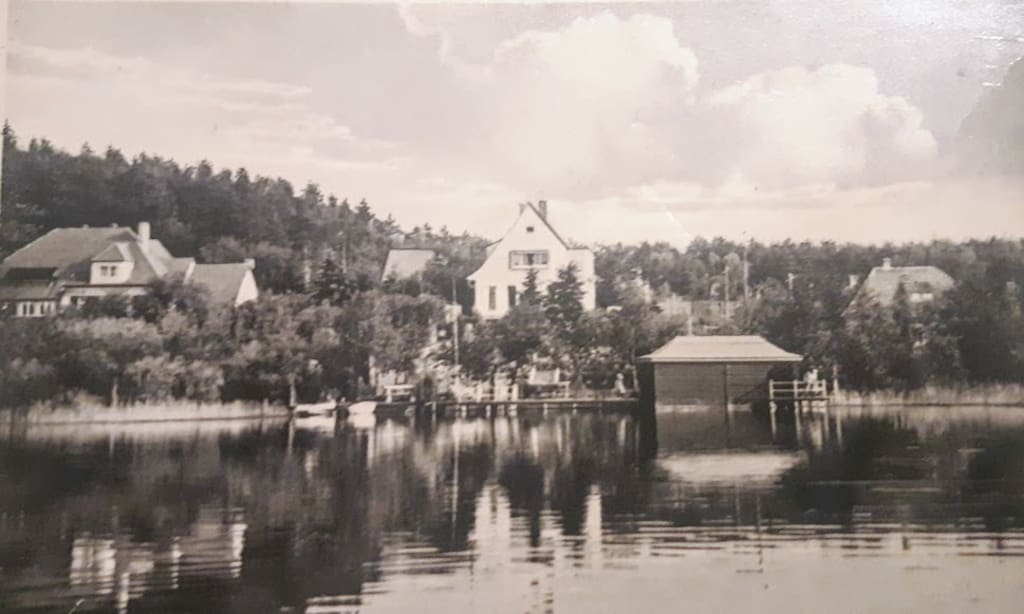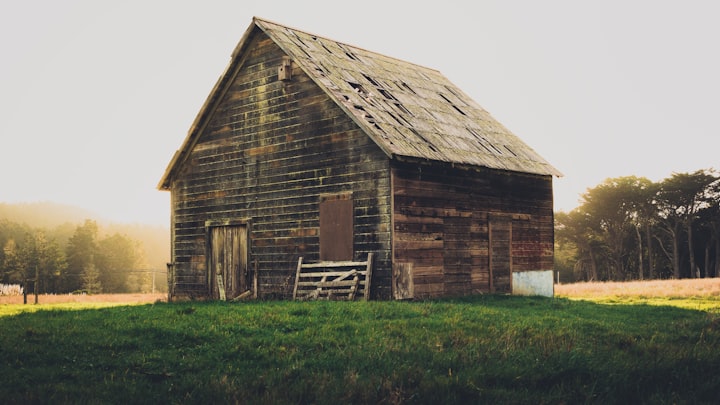
I originally wrote this story in my high school English class in the mid-eighties. It is about my mother’s childhood during the war. I wanted to recount everything she told me about this brief healing period of time that meant so much to her. It offered her stability and security in times full of fear, terror, and uncertainty.
These were happier times because of the house she stayed in by the lake in the country.
I believe this was an incredible opportunity and privilege for which she has always had so much gratitude. She avoided the emotional damage that many innocent civilians suffered witnessing the bombings in Berlin and atrocities of the holocaust.
Indeed, the emotional strain and damage were all too apparent in my father who in contrast had to stay in the city throughout the war and saw many terrible things.
I’m so glad I wrote it all down, as I had forgotten many of the details...
Recently, after having been separated from her for over a year due to the Pandemic, my mother (now age 85) randomly sent me the original type-written story, along with a postcard that is shown in the photograph above. Her name has been changed for privacy.
Lychen Germany 1943-1945
The rising danger of War World II was destined to devastate the city of Berlin to the core. With bunkers offering no solid protection, it was decided that evacuation to a safe, comfortable refuge in the countryside was the best safeguard for the girl and her mother.
And so, as a lanky, wide-eyed seven-year-old, little Jutta (YUTTA) made the quiet flight - guided by the firm clutch of her mother’s hand and carrying only the lightest of necessary belongings.
With the war at its peak, the city of West Berlin was a constant target of indiscriminate bombings. Life so far had seen little peacetime for this only child. Jutta clung to the short, sweet memories of trips to the seaside with her mother and father before the chaos ensued. Little did she know that the two years to come would make up the happiest times of her childhood despite the lingering terror of the ongoing war.
They traveled to the sleepy town of Lychen also know as Flößerstadt (raftsman city) in Brandenburg, Germany - an intersection of seven beautiful silky lakes, surrounded by rolling hills and lush forests. They were lucky to stay at an inn or guesthouse that was rented out to several similarly retreating families called 'Landhaus Seefrieden' or 'Inn on the Lake of Peace' - set by tranquil lake Oberpfuhl.
Jutta and her mother Camille loved their new abode at once. They were warmly welcomed by the dear lady who owned and operated the inn with great care and precision, Frau V.
“Hello, Jutta. And, how are you today?” she said bending down to the child, stroking her fine, brown hair and smiling.
From her first glance of the pretty house with its sun-filled stone terraces and flourishing garden, Yutta was filled with hope and wonder as she took in the delightful garden including a crop of white asparagus, a hazelnut bush flourishing in the yard, and colorful dahlias bursting beneath the oblong windows of the Inn.
Then, there was the lake with a charming little boathouse surrounded by forest. Jutta was quite fond of the small lake. It was where her mother taught her how to swim and ice skate. She loved to row the boats from the boathouse upon its smooth surface and slide and slither along the solid ice in the bitter winter on her half-hour treks to school every day. Sometimes during the coldest nights, the frozen lake would release explosive bangs that would startle Jutta out of her sleep.
The forest was another place full of adventure. She often went there to pick wild blueberries and mushrooms beneath the shade of the great trees.
There were so many lovely memories that remained with Jutta throughout her life. She recalled the fresh laundry billowing in the wind in the yard. And the dear people from whom she would soon separate, never to see again - like the plump neighboring Schmidt family of four - they were always jovial and loved playing instruments together.
Though her stay was filled with pleasantries, it was impossible to escape reminders of the brutal war. At night, the sirens announced bombers headed for the distant city and released an undulating, wailing whine. Its sudden screech pierced the stillness of the night and stabbed one’s resting soul like a violent attacker. It was a sound that became everlastingly etched in her memory for life - the terror triggered by any resembling sound throughout her life. It tore Jutta out of her peaceful sleep and caused a wave of fear as she stumbled out of her small bed, grabbed her tiny suitcase, and scuffled down to the cellar to join the mass of fellow boarders mirroring her thoughts: could it be us this time?
Then, there were the pensive, pained looks reflecting the dread of the cruel death and destruction the over-passing bombers signified. Sometimes, they watched the bombs explode right over Berlin from the boathouse -- like fireworks. Everyone was still and silent.
Jutta stood in the dim cellar, burying her head into her mother, trying to shield herself from the siren’s unrelenting racket. Loni - Mrs. V’s sausage dog often took to endless bouts of howling, as if to plead “stop, please stop!” The sirens went off continuously day and night, followed by the same, much-detested, panic-filled routine. When would this senseless war end?
Jutta's father stayed in the city core and commuted to the country for visits on weekends. She often worried about her father. Hans was a large, stout man with a shrewd business sense. It seemed he could survive anything. He had miraculously survived a bullet wound in his shoulder suffered in the first World War - which was thankfully rescued by a famous surgeon. Still, Jutta anxiously awaited his postcards each week, confirming that he was safe and still alive.
One day, while Hans was luckily in the safety of a bunker, their Berlin apartment was bombed and began to burn. The brave man entered the blazing unit in order to salvage a few good pieces of furniture and other valuables. He even managed to rescue Jutta’s dollhouse that she adored, but not her dolls or Teddy Anna. After such a courageous feat, her father rented a truck to bring the belongings to the Inn in Lychen, only to discover all the items stolen within days. A grim reward for risking one’s life!
When the war was over, Jutta and Camille returned to the city and could rebuild their lives. Though there was a wave of relief and joy reuniting with family and restored hope for a peaceful life, the post-war years proved to be especially trying. The tough road of recovery for the ravaged country confronted its worn citizens with continuing hunger and hardship. It would be many years before the country stabilized and life returned to some form of normal.
The unrest and hardships of the war that marked her childhood and adolescent years prompted Yutta to seek a fresh start in a nation with a peaceful reputation, where she would raise a family and live a good life.
In 1956, Jutta immigrated to Toronto, Canada, joining her husband, whom she married in Berlin at the young age of 19. They never regretted their choice to leave Germany as young adults, even though they did not have family in their new country. Jutta would only see her mother in person one last time. In the early '60s, she went to Berlin to introduce her newborn son Erhart. Camille died soon after. Her father, Hans visited Canada once before his death - bearing extravagant gifts for the young couple and meeting his new grandson in Niagara Falls, Canada - another water wonder.
It is not a mystery why they settled in a city by the five Great Lakes of North America, with close proximity to a stunning countryside just north of the city with a truly unique landscape of granite, smooth black lakes, rich forests, and diverse trees. Jutta spent many summers with her new young family visiting such lakeside towns as Muskoka, Haliburton, Bracebridge, Gravenhurst, Parry Sound, Grand Bend, Wasaga, and others.
Despite carrying some shame of her heritage - guilt that is quite common in immigrants of German descent (despite being children at the time) and the blatant emotional scars of the war - Jutta always cherished these happy memories of her relatively brief stay at the Inn on the Lake of Peace. She carried them close to her heart. She would be ok...it was all to be ok.
I think that my mother learned some invaluable tools that helped her deal with life's difficulties and traumas that we all come up against eventually.
Through her experiences at House Seefrieden - all those years ago - she learned to connect with nature, find a Zen, an inner calm, stillness, a solace in solitude; a meditative remedy for stress.
I am happy that she had this time; it was a gift. In a way, she taught me how to find peace in nature too, particularly by water.
To this day, I do prefer a still body of water (but the ocean will do any day) - somehow a large still, velvety smooth lake brings back calm and fond memories of my childhood too.
About the Creator
Jackie K
I'm a Canadian living in California. The page is my canvas; words my medium. I have always loved to write - my happy place. Having written prose to business plans, I now strive to write creatively - short stories are my jam.






Comments
There are no comments for this story
Be the first to respond and start the conversation.